In-Depth
AI, AI Agents and More: Microsoft Build 2025
Our "one-person SOC" from Down Under, Paul Schnackenburg -- definiely not a dev -- tuned into the dev-heavy Microsoft Build 2025 conference and walked away with valuable insights for IT teams. From Copilot Studio to local AI agents and post-quantum cryptography, his takeaway? Even if you're not coding, there's plenty to unpack in the agentic AI wave.
The recent Build conference brought some interesting reveals in the relentless march towards an agentic future for businesses. Build is a developer-focused conference, and while I'm definitely not a dev, there's always something to learn that's applicable for IT pros.
In this article I'll look at my favorite announcements, why they make sense for businesses and when to consider some of these announcements for your organization.
We'll start with Azure AI Foundry and Copilot Studio, look at agents and see how it's not all about the cloud with Foundry Local, plus some geospatial data with Microsoft Planetary Computer Pro, and add a sprinkling of post-quantum cryptography.
Foundry -- 'A Factory Where Metal Is Melted and Poured into Specially Shaped Containers to Produce Objects'
It's a clever use of the word -- a place to find the right model, experiment with it, fine-tune it and deploy it in as an app, or in an agent format. Azure AI Foundry supports both discriminatory and non-discriminatory AI models. The former is what we used to call AI before LLMs entered common language, models trained to spot specific types of signals in a lot of data, such as discerning a phishing email from a legitimate email. The latter is generative AI, based on LLMs or image / audio / video generation.
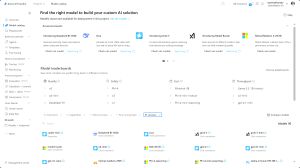 [Click on image for larger view.] Azure AI Foundry Model Catalog
[Click on image for larger view.] Azure AI Foundry Model Catalog
The catalog includes over 1,900 different models, with new ones added regularly. A big challenge in the "Wild West" of AI development at internet speed is knowing which model to use for what scenario. For some use cases you want a model that can reason over a complex question, break it down into discrete steps and work through them, for others you want fast responses in a chat-based interface and so on. And of course, you don't know which types of queries your end users will have, at least not until you roll out your prototype for testing. Foundry offers two solutions to this challenge. First are the model leaderboards where you can see them ranked for quality, safety, cost and throughput, with the ability to do your own comparison charts, weighing the parameters for your use case.
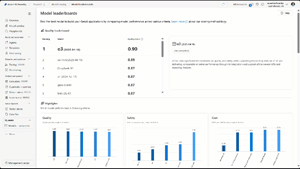 [Click on image for larger, animated GIF view.] Azure AI Foundry Model Leaderboards in Animated Action
[Click on image for larger, animated GIF view.] Azure AI Foundry Model Leaderboards in Animated Action
Secondly (only for Azure OpenAI models at the moment -- others to follow), Model Router will dynamically pick the appropriate model for each user prompt as it comes in, likely leading to considerable cost savings (the latest and greatest frontier models are cool, but also the most expensive).
A lot of Build was focused on AI agents, being the latest buzzword in our industry. This takes the chat-based interfaces we've been used to since ChatGPT became a household name and instead sets up an agent to receive instructions, and it then gathers additional data where required and follows up with actions it can take to complete the assigned task.
The agent service in Foundry is now generally available (introduced in public preview at Ignite 2024). But that's only the start, the real magic happens when several agents get involved, either through connected agents where an agent calls on other agents to complete each task or multi-agent workflows where there's a structured, stateful orchestrator that coordinates multiple agents in a multi-step process. Support for the Agent2Agent (A2A) protocol is in preview. You don't have to start from scratch; Foundry offers agent samples that you can use to get started with.
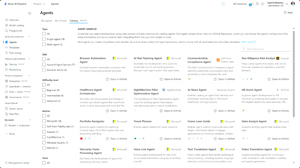 [Click on image for larger view.] Azure AI Foundry Agent Samples
[Click on image for larger view.] Azure AI Foundry Agent Samples
Like many other cloud services, Foundry builds on other successful building blocks and can now use Logic App integrations to provide workflow and connectivity to hundreds of external systems, with little or no code required.
The most common reason to create your own AI app or chat interface is to link to an existing set of data. SharePoint is now built in, as is Microsoft Fabric and Bing search. You can either provide this data at query time (with caching to speed up performance) with Retrieval Augmented Generation (RAG) or by fine tuning the model by training a foundation model with your custom data. The choice here is heavily dependent on the nature of that data. If it's changing daily or very frequently, RAG is better, whereas if the data doesn't change often, a fine-tuned model might be a better option.
Interestingly, even for a developer audience, the recommendation when looking to build an agent for a scenario was not to start in Foundry, but rather in Copilot Studio. This is available to everyone with a Microsoft 365 Copilot license and lets you build agents with natural language input. Only when your agent requirements hit the limits of Copilot Studio should you look at Foundry for development. Here you can see some sample templates in Copilot Studio, with the Interview Questions Assistant selected.
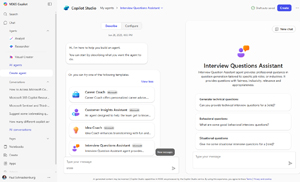 [Click on image for larger view.] Copilot Studio Agent Templates
[Click on image for larger view.] Copilot Studio Agent Templates
There are also ready-made agents by Microsoft and third parties available in the new Agent store in Copilot Studio that you can use. There's help for developers to get their agents into this store.
Another assist is the Microsoft 365 Agents toolkit, formerly known as the Teams toolkit. This SDK helps with building apps and agents for Teams, as well as Copilot.
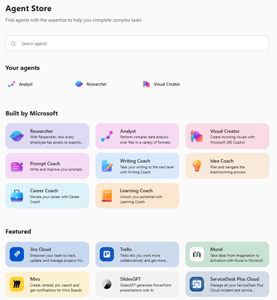 [Click on image for larger view.] Agent Store in Copilot Studio
[Click on image for larger view.] Agent Store in Copilot Studio
Security is not forgotten. Every agent you create in Copilot Studio or Azure Foundry will be given an identity in Entra ID, with third-party agent identities coming, and Purview data security and compliance is automatically enabled for Copilot Studio or Foundry agents. As for authentication in the agentic world, the Model Context Protocol (MCP, which no longer refers to a Microsoft Certified Professional apparently) is the newest kid on the block, but the OAuth protocol it relies on must evolve, as Alex Simons from Microsoft points out. MCP is supported in both Foundry and Copilot Studio, but it looks like the IT industry is doing what it always does, rushing ahead with "innovation" and bringing solutions to market, and only thinking about security after the fact. This recent article is a good look at the risks of the MCP protocol to a business.
Copilot Studio also has preview support for multi agents, plus a tight integration with Foundry.
If your business is looking to build agents to improve business processes, Microsoft has a great foundation in these tools, good guardrails founded in their Responsible AI principles, and tech such as Prompt Shield, Content Safety and Purview data governance built in.
It's Not All About the Cloud -- Foundry Local
There are many scenarios where business or compliance needs require you to use a local AI model, rather than sending data to the cloud. The network delay can also be a limiting factor for some use cases. Foundry Local offers an Open Neural Network Exchange (ONNX) Runtime for both Windows and MacOS, that can run across CPUs, GPUs and Neural Processing Units (NPUs) from AMD, Intel, NVIDIA and Qualcomm. Supported models today are DeepSeek R1, Qwen 2.5 Instruct, Phi-4 Reasoning, Mistral and additional ONNX-format models from Hugging Face.
The point is that this isn't just for developers to play with LLMs on their local PCs, this can give you production-grade AI solutions that do all the work locally, when the use case demands it. And we'll finally start seeing some real use of those NPUs that recent "AI Enabled / Copilot+" PCs come with.
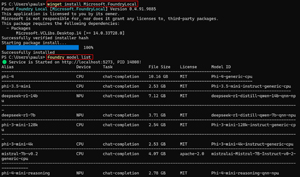 [Click on image for larger view.] Agent store in Copilot Studio
[Click on image for larger view.] Agent store in Copilot Studio
If you're looking to run more traditional ML on your end user's device, the new Windows ML is a good place to start.
Overall, I think we're going to see more local AI solutions for the many scenarios where this makes more sense than sending sensitive data to the cloud (and then via MCP to who knows where), especially as more capable local hardware becomes more ubiquitous.
Where Art Thou? Planetary Computer Pro
Planetary Computer Pro is in public preview (with not a single session dedicated to it). The idea with this service is to democratize access to geospatial data, making it easy for business users to plot their data against geographical data layouts and chat with it using Copilot.
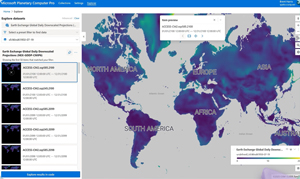 [Click on image for larger view.] Microsoft Planetary Computer Pro Explorer
[Click on image for larger view.] Microsoft Planetary Computer Pro Explorer
It comes with 120 distinct geospatial datasets that are over 50PB in volume, and it certainly makes sense to have this kind of service in the public cloud where you can pick the particular data and zoomed in area on the planet where you need to show the right information. I'm looking forward to seeing this service being demonstrated with real-world use cases, and if your business users could benefit from being able to overlay your data with geography, take a look at this service.
Post-Quantum Encryption Incoming
A quick recap -- all the major tech companies are trying to develop quantum computers, which use the characteristics of quantum physics to be able to do specific types of calculations much faster than traditional computers. No one knows when a Cryptographically Relevant Quantum Computer (CRQC) will be available (estimates range from a few years to a few decades), but when they are, much of the encryption we rely on today will be trivially easy to break. But that doesn't mean businesses can wait for that day to arrive, because all major nation state players are already storing captured data they can't read today but will be able to do then. The solution is Post Quantum Cryptography (PQC) algorithms that if used instead of or in parallel with today's encryption, will protect the data when a CRQC is available. NIST has standardized three such schemes, with a fourth to follow soon, and here's a roadmap to help plan your organization's adoption.
Recent builds of Windows, and the SymCrypt-OpenSSL package for Linux from Microsoft brings ML-KEM and ML-DSA to Windows insiders.
Now that we have the algorithms, the challenge will be bringing PQC to all the places where it will be needed, and given how our society is dealing with another long-term, society-wide threat -- human-caused climate change -- I'm not holding my breath. And I note that the current US administration is rolling back efforts to ensure federal government agencies implement PQC.
Conclusion
There's no doubt that AI reasoning models, the A2A and MCP protocols can elevate the concept of AI agents from improving personal productivity to truly transformational technology. And Microsoft is certainly laying out the runway for developers (both real ones and normal business users) to help build those on the foundations of Copilot and Azure AI Foundry. We live in interesting times indeed.